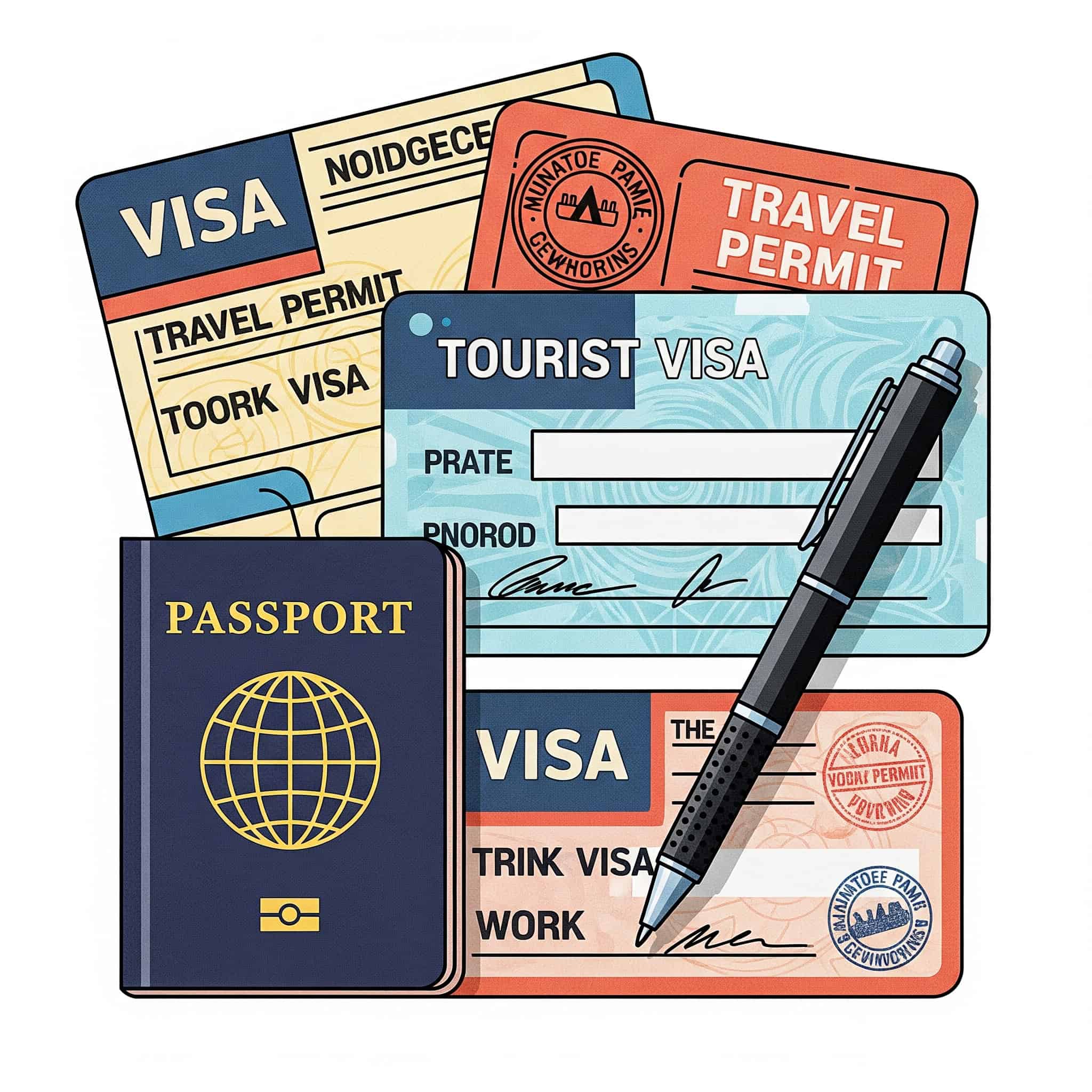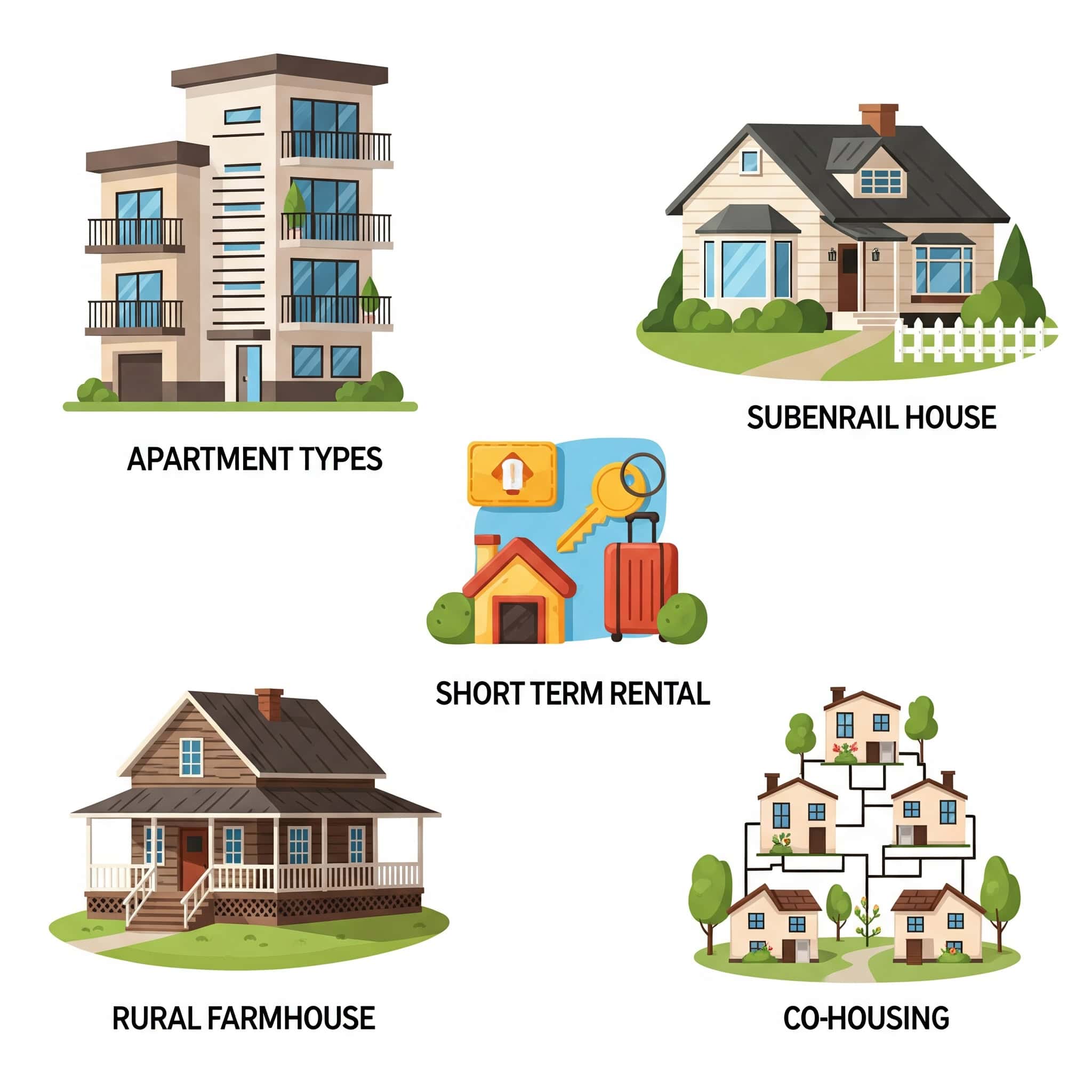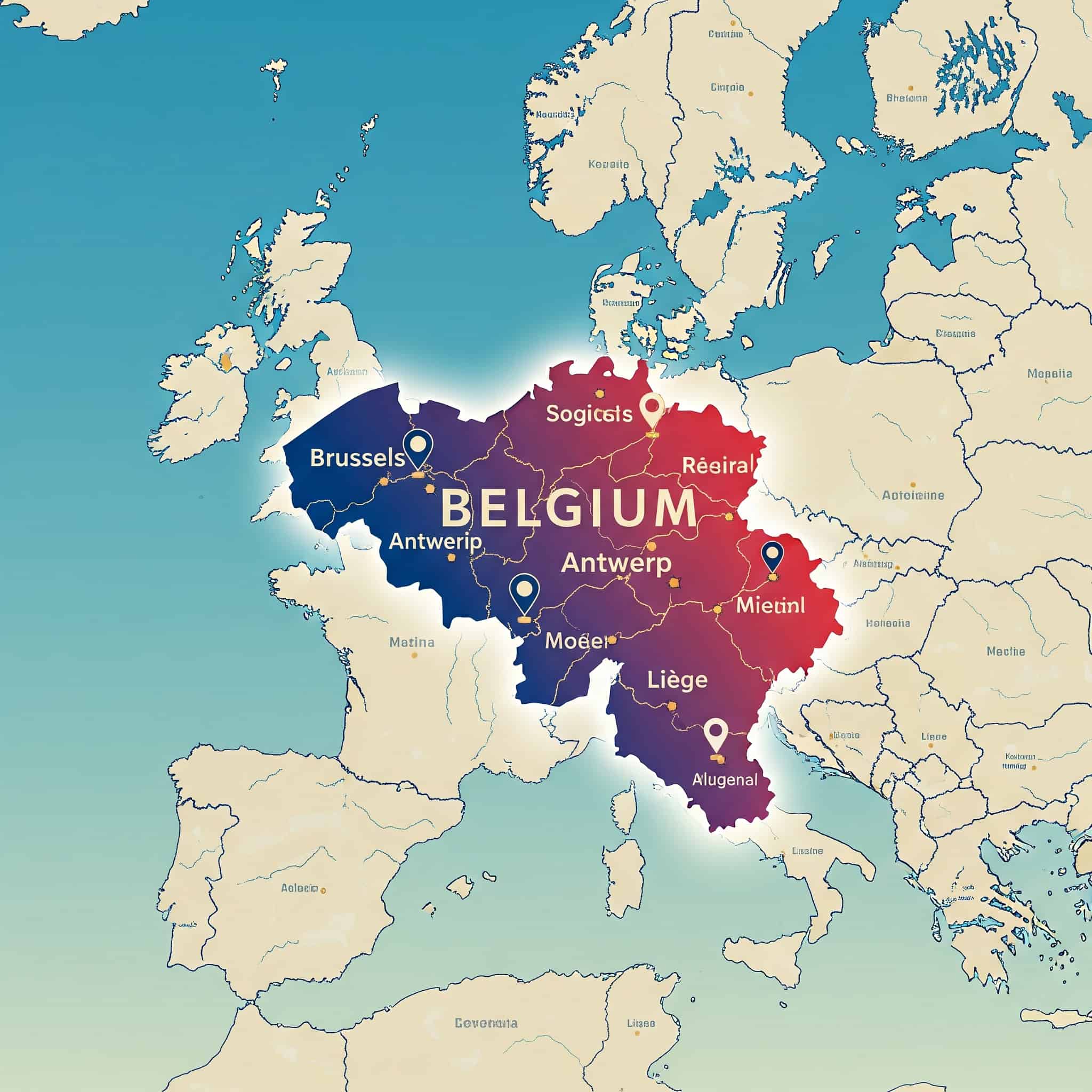Moving to Belgium from the US: 25 Essential Options for a Smooth Transition
Table of Contents
Key Considerations When Moving to Belgium
Immigration Pathways
Housing Options
Employment and Business Opportunities
Healthcare and Education
Lifestyle and Cultural Integration
How Jiffy Junk Can Help with Your International Move
Final Thoughts
Key Considerations When Moving to Belgium
Moving to Belgium requires careful planning across multiple fronts. I’ve found that the immigration requirements can be quite different from what we’re used to in the States. You’ll need to navigate visa and residency permits that vary based on your reason for relocating to Belgium.
The Belgian job market has its own quirks too. Depending on where you settle, you might need to brush up on your French, Dutch, or even German! I was surprised by how much language skills matter in daily life and professional settings.
One thing that caught me off guard was the cost of living structure. Belgium has higher taxation rates than what we’re used to in the US, but this comes with more comprehensive social benefits. I had to adjust my budget expectations pretty quickly after arriving.
Cultural adaptation is essential since Belgium has three distinct linguistic regions with different customs. I remember feeling a bit overwhelmed at first by the regional differences between Flanders, Wallonia, and Brussels.
The practical logistics can be a headache if you don’t plan ahead. International moving arrangements, banking setup, healthcare enrollment, and understanding dual-country tax obligations should be addressed proactively. Americans can stay in Belgium as tourists for only 90 days before requiring proper residency documentation, with application processes often taking 3-6 months to complete.
US citizens maintain tax filing requirements with the IRS even while living abroad, though the Foreign Earned Income Exclusion may exempt the first $120,000+ of foreign earnings from US taxation. I wish I’d known this before my first tax season abroad!
When moving to Belgium from the US, many people find that decluttering before the move can significantly reduce shipping costs and make the transition smoother.
Key Consideration | US System | Belgian System |
|---|---|---|
Taxation | Lower income tax rates (10-37%) | Higher progressive rates (25-50%) |
Healthcare | Primarily private insurance | Universal public coverage with supplemental options |
Work-Life Balance | Average 10 days vacation | Minimum 20 days paid leave + holidays |
Language | English dominant | Three official languages (Dutch, French, German) |
Banking | Check-based transactions common | Electronic transfers standard |
Immigration Pathways
1. Work Permit B (Single Permit)
The Work Permit B serves as the primary immigration Belgium pathway for Americans with job offers from Belgian employers. Your prospective employer typically initiates the application process, demonstrating that the position couldn’t be filled by an EU citizen.
The initial validity matches your employment contract duration (usually one year) and remains renewable as long as you maintain employment with the sponsoring company. This permit restricts you to working specifically for the sponsoring employer, limiting job mobility during your initial stay in Belgium.
Processing time for Work Permit B applications typically ranges from 4-5 months, requiring advance planning before your intended move date. I learned this the hard way when my start date had to be pushed back twice!
The application requires proof from the employer that the position couldn’t reasonably be filled by an EU/EEA citizen or current Belgian resident, making specialized skills or experience crucial for approval. My employer had to document their recruitment efforts and explain why my specific experience was essential for the role.
2. EU Blue Card
The EU Blue Card targets highly-qualified professionals with higher education qualifications and offers more flexibility than standard work permits. You’ll need a job offer with a salary at least 1.5 times the average Belgian gross annual salary (approximately €65,000+).
Initially valid for up to two years and renewable, this permit allows you to change employers after the first two years without applying for a new permit. The Blue Card also provides a faster track to permanent residency and potential EU-wide mobility after 18 months.
Applicants must possess a higher education qualification requiring at least three years of study or five years of professional experience at a comparable level. I found that getting my university credentials evaluated by a Belgian authority was an essential step in the process.
Blue Card holders can bring family members through a simplified family reunification process, with spouses receiving automatic work authorization. This was a huge relief for my partner, who was worried about finding work.
3. Self-Employed Visa (Professional Card)
The Professional Card serves entrepreneurs, freelancers, and business owners wanting to immigrate to Belgium and establish themselves there. You’ll need to prove your business provides economic benefit to Belgium through a detailed business plan and financial viability documentation.
The application undergoes rigorous scrutiny by economic authorities evaluating your project’s sustainability and value to the Belgian economy. Typically granted for 2-5 years initially and renewable, this permit allows you to operate your business legally while residing in Belgium.
Applications require demonstrating sufficient financial resources (typically €50,000+ in startup capital), relevant qualifications, and compliance with Belgian professional regulations for your industry. I was surprised by how detailed my business plan needed to be – they wanted five-year projections and market analysis.
Professional Card holders must register with a social security fund for self-employed individuals and make quarterly contributions (approximately 20-25% of income) to access healthcare and build pension rights. These contributions were higher than I expected but provide comprehensive benefits.
4. Family Reunification Visa
The Family Reunification Visa allows spouses, registered partners, and dependent children of Belgian citizens or legal residents to join their family members in Belgium. You’ll need to provide proof of your relationship, the Belgian sponsor’s financial means (minimum €1,700/month), and suitable accommodation documentation.
Processing typically takes 6-9 months, after which you’ll receive residency rights. Following a cohabitation period (typically 3-5 years depending on circumstances), you can apply for permanent residency independent of your sponsor.
Sarah, an American citizen, married Marc, a Belgian national, after meeting during his MBA studies in Chicago. For their family reunification application, they submitted their marriage certificate, Marc’s employment contract showing his €3,200 monthly salary, rental agreement for their two-bedroom apartment in Brussels, and health insurance coverage documentation. While waiting for approval, Sarah visited Belgium twice on 90-day tourist stays. After approval six months later, she received a one-year renewable residence card, allowing her to work without additional permits. After three years of legal cohabitation, she successfully applied for permanent residency.
The sponsoring family member must demonstrate stable and regular income at least 120% of the Belgian social integration income level to qualify as a sponsor. My friend’s application was initially rejected because her husband’s freelance income was deemed too irregular, despite meeting the minimum amount.
Initial residence permits through family reunification are temporary (1-3 years) but lead to permanent residence rights after the required cohabitation period, provided the relationship remains intact. This creates a period of dependency that can be challenging for some couples.
5. Long-Term Residency Permit
After five years of legal residence in Belgium, you can apply for a Long-Term Residency Permit that provides nearly equal rights to Belgian citizens. You’ll need to demonstrate integration evidence (language proficiency, civic course completion), stable income history, and maintain a clean criminal record.
This permit remains valid for five years and is renewable, granting you freedom to work anywhere in Belgium without employer sponsorship. It also provides enhanced protection against deportation and simplified administrative procedures for many government services.
Applicants must prove uninterrupted legal residence with no absences exceeding 6 consecutive months or 10 months total during the 5-year qualifying period. I had to provide documentation of all my international travel during this period, which was more detailed than expected.
Long-term residents gain limited mobility rights within other EU countries, allowing stays up to 90 days and simplified procedures for obtaining work authorization in other member states. This flexibility has been invaluable for my consulting work that occasionally takes me to neighboring countries.
Housing Options
6. Apartment Rental in Urban Centers
Apartment rentals dominate housing options in Belgian cities like Brussels, Antwerp, and Ghent. You’ll typically find unfurnished units that may not include kitchen appliances or even light fixtures—a significant difference from US rental standards.
Standard leases run nine years with three-month notice periods for tenants, though shorter-term contracts exist with less favorable terms. Expect to pay a three-month security deposit upfront and register your lease with the local municipality for tax purposes. Monthly rents range from €700-1,500 depending on size, location, and amenities.
Belgian rental law heavily favors tenants, with strict regulations on rent increases (typically limited to inflation adjustments) and property maintenance responsibilities clearly defined by law. When my shower broke, I was surprised to learn that the landlord was legally required to fix it within a specific timeframe.
Rental agreements must be registered with the Registration Office within two months of signing, with the registration fee (typically €50) legally the landlord’s responsibility though sometimes negotiated. My first landlord tried to pass this cost to me until I politely pointed out the legal requirement.
7. Suburban Single-Family Homes
Suburban homes offer more space but at higher prices than urban apartments, typically located in residential areas surrounding major Belgian cities. Purchase costs vary widely by region, with property purchase taxes around 12.5% in Brussels/Wallonia and 10% in Flanders—significantly higher than US closing costs.
These homes often feature small gardens and provide quieter living environments but require longer commutes to city centers. The Belgian property purchase process involves notaries and takes 3-4 months from offer to closing.
Property transactions require a notary who handles the deed transfer, title search, and tax payments, with notary fees typically adding 2.5-4% to the purchase price. I was shocked by how much these additional costs added to my budget when buying my first home here.
Belgian mortgages typically require 20% down payment and offer both fixed and variable rate options, with terms up to 25 years and interest partially tax-deductible under certain conditions. The mortgage application process is more conservative than in the US, with stricter income verification requirements.
8. Rural Properties
Rural Belgian properties offer lower purchase prices but often require significant renovation investment. Farmhouses and countryside homes provide more space and land but necessitate car dependency and careful navigation of strict Belgian building regulations even for renovations.
Property taxes remain lower than in urban areas, but utility costs may be higher, especially for older properties with poor insulation. Rural living provides authentic cultural immersion but can complicate initial integration due to stronger local dialects and fewer expatriate support networks.
Renovation permits (urbanisme/stedenbouw) must be obtained before work begins, with applications requiring detailed plans and potentially archaeological or environmental impact assessments in protected areas. My neighbor’s renovation was delayed six months when they discovered historical significance in their property’s foundation.
Rural properties may have specific zoning restrictions (agricultural, residential, or mixed-use) that limit property usage and development potential, requiring careful verification before purchase. I almost purchased a beautiful farmhouse before discovering I couldn’t convert the barn into a home office due to agricultural zoning restrictions.
For those who move to Belgium and purchase rural properties, yard waste removal services can be essential during property renovations and landscaping projects.
9. Short-Term Furnished Rentals
Short-term furnished rentals provide an ideal transition solution while you search for permanent housing after you move to Belgium. These accommodations come at a premium (30-50% higher than unfurnished equivalents) but include utilities and furnishings with flexible lease terms typically ranging from 1-6 months.
Specialized agencies catering to expatriates handle most of these properties, often requiring international payment guarantees or larger security deposits from newcomers without Belgian credit history. These rentals provide convenience but limit your ability to personalize your living space.
Short-term rentals often operate under commercial rather than residential lease laws, providing fewer tenant protections but greater flexibility for both parties. I appreciated the simplicity of my all-inclusive rental when I first arrived, but was surprised by how few rights I had when the owner decided to sell the property.
Many short-term rental agencies offer “relocation packages” that include airport pickup, orientation tours, and administrative assistance with registration procedures for an additional fee. These services saved me countless hours of frustration during my first weeks in the country.
Housing Option | Average Monthly Cost | Typical Lease Term | Pros | Cons |
|---|---|---|---|---|
Urban Apartment | €900-1,500 | 9 years (standard) | Central location, good public transport | Smaller space, higher cost/m² |
Suburban Home | €1,200-2,000 | Purchase common | More space, garden access | Commuting time, higher maintenance |
Rural Property | €800-1,200 | Purchase common | Affordability, space, privacy | Car dependency, renovation needs |
Furnished Rental | €1,500-2,500 | 1-6 months | Move-in ready, flexible terms | Higher cost, limited personalization |
Co-Housing | €700-1,200 | Variable | Community support, shared costs | Reduced privacy, community obligations |
10. Co-Housing Communities
Co-housing communities represent a growing trend in Belgian cities, offering private living spaces combined with shared facilities. These intentional communities range from family-oriented developments to eco-communities focused on sustainable living.
You’ll purchase or rent your private unit while sharing costs for common areas like gardens, guest accommodations, and community spaces. Monthly fees cover maintenance and utilities for shared spaces. These communities provide built-in social networks particularly valuable for newcomers, though decision-making processes require participation in community governance.
Legal structures for co-housing typically involve a homeowners association (syndic/vereniging van mede-eigenaars) with specific bylaws governing common space usage, decision-making processes, and financial contributions. The monthly meetings can be time-consuming but create a strong sense of ownership and community.
Many co-housing projects qualify for sustainability subsidies from regional governments, potentially reducing purchase costs or funding energy-efficient renovations. My co-housing community received a substantial grant to install solar panels that significantly reduced our collective energy costs.
Employment and Business Opportunities
11. International Organization Employment
Brussels hosts numerous international organizations including EU institutions, NATO, and various NGOs offering competitive employment packages for those moving to Belgium. These positions typically provide salaries 30-50% higher than comparable private sector roles, comprehensive benefits packages, and often tax advantages through special status agreements.
Competition remains fierce, with positions requiring relevant experience and specific language skills. Application processes involve multiple interview rounds and can take 6-12 months from application to start date. These organizations typically provide relocation assistance and integration support for international hires.
Many international organization employees qualify for special tax status, potentially exempting them from Belgian income tax while still accessing public services. This creates a significant financial advantage that can make a huge difference in your quality of life.
Employment contracts often follow different rules than standard Belgian labor law, with specific provisions for diplomatic status, immunity protections, and international pension schemes. I was surprised to learn that my friend working at NATO has a completely different healthcare system than I do, despite us living in the same neighborhood.
12. Multinational Corporation Transfer
Intra-company transfers to Belgian offices simplify the work permit process significantly and often include comprehensive relocation packages for employees moving to Belgium. Your existing employer handles most immigration paperwork, typically provides temporary housing, and may offer language training and cultural adaptation support.
Salary adjustments accommodate Belgium’s higher cost of living and tax rates, while benefit packages expand to include Belgian standards like 20+ vacation days annually and 13th-month bonuses. These positions offer international career advancement opportunities while maintaining organizational continuity during your transition.
Michael, a software engineer at a major tech company in Seattle, accepted an internal transfer to his company’s Brussels office. His employer handled his Single Permit application, provided three months of temporary housing in a furnished apartment near the office, and covered relocation costs including shipping his household goods. The company arranged Belgian language courses twice weekly and assigned a relocation consultant who helped him find permanent housing and complete his commune registration. His compensation package included a 15% cost-of-living adjustment, enrollment in the company’s international health plan, and alignment with Belgian work standards including 25 vacation days and a year-end bonus. The structured support significantly reduced his transition stress and allowed him to focus on professional integration with his new team.
Intra-corporate transferees may qualify for the “expatriate tax regime” offering tax exemptions on certain allowances and expenses for qualifying executives and specialists. This can result in significant tax savings, though the rules have become stricter in recent years.
Belgian employment contracts provide stronger protections than US equivalents, with termination requiring notice periods based on seniority (potentially 3+ months) or equivalent compensation. This creates a more secure employment environment but can make companies more cautious about hiring.
13. Freelance Work/Digital Nomad
Freelancing in Belgium requires obtaining a Professional Card and registering as self-employed with social security authorities. You’ll make quarterly social security contributions (approximately 20-25% of income) that provide comprehensive benefits including healthcare, family allowances, and pension rights.
Belgium’s central European location and excellent connectivity make it attractive for digital professionals who migrate to Belgium while serving international clients. Co-working spaces in major cities offer professional environments and networking opportunities for around €200-300 monthly, helping combat isolation while building professional connections.
Self-employed individuals must register with a social insurance fund (caisse d’assurances sociales/sociale verzekeringskas) within 90 days of starting activities and make quarterly contributions based on projected income. I underestimated my first year’s income and had to make a substantial adjustment payment, so I recommend working with an accountant familiar with freelance taxation.
Belgium’s intellectual property regime offers potential tax advantages for certain creative professionals, with royalty income potentially qualifying for reduced tax rates. This has been particularly beneficial for my work as a content creator, though the qualification requirements are quite specific.
Many freelancers who migrate to Belgium find that setting up a proper home office is essential for productivity and maintaining a professional work environment.
14. Teaching English
English teaching positions exist in language schools, international businesses, and educational institutions throughout Belgium. TEFL certification typically serves as the minimum qualification, with more prestigious positions requiring education degrees or extensive experience.
Many teachers start with part-time positions at multiple schools before securing full-time roles or building a private client base. Hourly rates range from €20-50 depending on your qualifications and the setting. Networking proves crucial for finding opportunities, with expatriate organizations and professional teaching associations providing valuable connections.
Language schools typically hire teachers as independent contractors rather than employees, requiring self-employment registration and personal management of tax and social security obligations. This arrangement offers flexibility but lacks the security of traditional employment benefits.
The Belgian school system includes subsidized language education for adults through promotion sociale/sociale promotie programs, offering potential teaching opportunities with government benefits but requiring working knowledge of Dutch or French. I found these positions particularly stable once I developed sufficient language skills to navigate the application process.
15. Starting a Business
Establishing a business in Belgium requires obtaining a Professional Card and navigating a structured company formation process when moving to Belgium. You’ll need a viable business plan, proof of professional qualifications, and sufficient startup capital.
The process takes 4-6 months but provides access to the EU market of 450+ million consumers. Belgian business structures include sole proprietorships (simplest) and limited liability companies (requiring €18,550 minimum capital for SRLs). Various government incentives exist for certain sectors, particularly technology, research, and sustainable development.
Business establishment requires proving professional competence through recognized qualifications or experience, with certain regulated professions requiring specific Belgian certifications. I had to have my marketing credentials evaluated by a professional association before I could establish my consultancy.
Company formation involves notarized articles of incorporation, registration with the Crossroads Bank for Enterprises (BCE/KBO), VAT registration, and activation of a business bank account—typically costing €1,500-2,500 in administrative fees. The process is more formalized than in the US, but the resulting structure provides clear legal protection and credibility in the European market.
Healthcare and Education
16. Public Healthcare System Registration
Registering with Belgium’s public healthcare system is mandatory for legal residents and provides comprehensive coverage at affordable rates when moving to Belgium. You’ll join a health insurance fund (mutuelle/ziekenfonds) of your choice, paying monthly contributions based on your income level.
The system covers approximately 75% of medical costs, with patients paying upfront and receiving reimbursements within weeks. Supplementary insurance (€10-30 monthly) covers additional services like dental care and hospital room upgrades. The quality of care ranks among Europe’s highest, with short wait times for most procedures and excellent specialist access.
Healthcare registration requires proof of residency status, national register number, and employment/self-employment documentation, with coverage typically beginning the month following registration. I was surprised by how quickly I received my insurance card once my paperwork was processed.
The Belgian healthcare system operates on a reimbursement model using standardized fee schedules (nomenclature), with providers able to charge supplements above official rates for certain services or accommodations. I recommend keeping a dedicated folder for medical receipts as you’ll need to submit them regularly for reimbursement.
17. International Schools for Children
International schools offer English-language education following various curricula including International Baccalaureate, British, and American systems. Annual tuition ranges from €15,000-35,000 per child, often partially subsidized by employer relocation packages.
These schools provide educational continuity for families planning shorter stays or eventual return to their home countries. Facilities typically include modern technology, extensive extracurricular activities, and support services for non-native English speakers. Admission processes involve testing, interviews, and previous school records, with applications needed 6-12 months before enrollment for popular schools.
International schools in Belgium hold different accreditations (IB, Council of International Schools, Middle States Association) affecting university recognition of diplomas and curriculum standards. This becomes particularly important for high school students planning to attend university in the US.
Many international schools offer partial scholarships or sliding-scale tuition based on financial need, though these programs remain limited and highly competitive. I was pleasantly surprised when my children’s school offered a sibling discount that made the tuition more manageable for our family.
18. Belgian Public Education System
Belgium’s public education system provides free or very low-cost education with high academic standards for families moving to Belgium. Schools operate in the language of their region (Dutch, French, or German), though some offer language immersion programs.
Registration requires proof of residence, identity documents, and previous school records. Children receive additional language support through integration programs, accelerating their acquisition of the local language. The school calendar runs September to June with Wednesday afternoons typically free. Parent participation in school activities helps build community connections and supports your child’s integration.
Education is organized by linguistic community rather than federal government, with different structures and curricula in Flemish, French, and German-speaking systems despite maintaining equivalent qualification standards. This can be confusing at first, but each system has its own strengths.
School choice exists within the public system, with parents able to select any school regardless of residence location, though proximity criteria may apply when schools reach capacity. I was able to enroll my daughter in a school with a strong music program despite it being outside our immediate neighborhood.
19. Higher Education Opportunities
Belgian universities offer internationally recognized degrees with significantly lower tuition than US institutions (€835-3,000 annually for EU residents, €3,000-12,000 for non-EU students). Many graduate programs are taught entirely in English, particularly in fields like business, engineering, and sciences.
Student visas require proof of acceptance and financial means (approximately €10,000 for living expenses). Programs include practical components through internships and industry partnerships, potentially leading to employment opportunities after graduation. University cities provide vibrant, affordable environments with strong international student communities.
Non-EU students can work part-time (20 hours weekly during term, full-time during vacations) with their student residence permit, providing income while studying. This work permission is automatically included in your residence card, with no separate application required.
Belgian degrees follow the Bologna Process structure (Bachelor’s/Master’s/Doctorate) ensuring recognition throughout Europe, with many programs offering joint degrees with partner universities in other countries. My master’s program included a semester at a partner university in France, adding valuable international experience to my resume.
Education Option | Average Annual Cost | Language of Instruction | Key Advantages | Considerations |
|---|---|---|---|---|
Public Schools | Free-€200 | Dutch/French/German | Free quality education, local integration | Language adjustment period |
International Schools | €15,000-35,000 | English (+ other languages) | Familiar curriculum, international environment | High cost, potential cultural isolation |
European Schools | €3,000-6,000 | Multilingual (English sections) | European Baccalaureate, EU institution priority | Limited locations, competitive admission |
Higher Education | €835-12,000 | Dutch/French/English (graduate) | Affordable quality degrees, international recognition | Language requirements vary by program |
Adult Education | €100-500 per course | Varies by program | Professional development, integration support | Evening/weekend schedule common |
20. Healthcare for Retirees
Retirees benefit from the US-Belgium social security agreement allowing coordination of benefits between both systems. Medicare doesn’t cover care in Belgium, necessitating enrollment in the Belgian system or private international insurance (€300-500 monthly for comprehensive coverage).
The Belgian system provides excellent geriatric care with home assistance services, specialized clinics, and long-term care facilities. Prescription medications cost significantly less than in the US due to government price controls. Preventive care receives emphasis with regular check-ups and screening programs covered by basic insurance.
The bilateral social security agreement allows counting work credits from both countries toward minimum qualification periods, potentially enabling partial pension benefits from both systems. This can be particularly valuable if you’ve split your career between the US and Belgium.
Belgium’s healthcare system includes a separate insurance program for long-term care (zorgverzekering in Flanders) covering home assistance and nursing home costs, with mandatory enrollment in some regions. I was impressed by the comprehensive support available to my elderly neighbor, who receives daily home care visits at minimal personal cost.
For retirees who live in Belgium, having a plan for disposing of old appliances can be helpful when setting up a new home or upgrading existing equipment.
Lifestyle and Cultural Integration
21. Language Learning Programs
Government-subsidized language courses make learning Dutch, French, or German affordable and accessible throughout Belgium. Programs cost €40-100 for 60-hour modules (significantly below market rates due to subsidies) with intensive and part-time options accommodating various schedules.
Courses focus on practical communication skills with levels progressing from A1 (beginner) through C2 (mastery) following the European Framework. Language proficiency significantly impacts your social integration and employment opportunities, with even basic skills demonstrating commitment to integration. Online platforms supplement classroom learning with practice opportunities between sessions.
Integration authorities in each region (BON in Brussels, Atlas in Antwerp, etc.) coordinate language programs with standardized testing and certification recognized for citizenship and permanent residency applications. I found the structured approach helpful for tracking my progress.
Language course participation can be mandatory for certain visa categories, with attendance and progress monitoring affecting residence permit renewals. My friend’s residence renewal was delayed because she hadn’t completed the required language modules, so it’s worth taking these requirements seriously.
22. Expatriate Community Groups
Expatriate organizations provide valuable support networks during your transition to Belgian life. Groups like the American Club of Brussels, Brussels Women’s Club, and professional associations organize networking events, holiday celebrations, and information sessions on practical topics for expatriates in Belgium.
Membership fees range from €50-200 annually depending on services offered. These communities provide immediate social connections and practical advice from experienced expatriates who’ve navigated similar challenges. Online forums and social media groups supplement formal organizations with real-time assistance for specific questions.
Jennifer relocated to Ghent with her family when her husband accepted a university research position. Initially feeling isolated while working remotely for her US employer, she joined the Expats in Ghent Facebook group and attended their monthly meetup at a local brewery. Through these connections, she found a weekly language exchange where she practiced Dutch with locals while helping them with English. She later joined the American Women’s Club, participating in their book club and volunteer initiatives at a local food bank. These community connections provided practical support (recommendations for doctors, accountants, and schools) and social opportunities that transformed her experience from isolation to integration. Three years later, Jennifer now volunteers as a mentor for newly arrived expatriates, helping them navigate the same challenges she once faced.
Many expatriate organizations maintain formal relationships with embassies and international businesses, providing access to diplomatic updates and employment networking opportunities not available through public channels. The embassy notifications about tax changes saved me from missing an important filing deadline.
Professional expatriate groups often organize continuing education and certification maintenance opportunities recognized by US licensing bodies, helping maintain professional credentials while abroad. This has been invaluable for maintaining my professional certifications without returning to the US.
23. Cultural Integration Courses
Cultural integration programs provide structured introduction to Belgian institutions, customs, and daily life practicalities for those moving to Belgium. Some regions offer formal integration programs (inburgering in Flanders) covering topics from healthcare navigation to employment norms.
These courses include practical exercises like using public transportation and accessing government services. Programs accommodate working professionals with flexible scheduling options including evening and weekend sessions. While some visa categories mandate participation, voluntary enrollment demonstrates integration commitment for future residency applications.
Completion certificates from official integration programs can satisfy civic integration requirements for permanent residency and citizenship applications, potentially reducing waiting periods. I was able to use my course completion as supporting documentation for my permanent residency application.
Integration courses include modules on Belgian political structures, historical context, and cultural values that provide deeper understanding of societal norms beyond practical information. I found the historical context particularly helpful for understanding regional tensions that still influence daily life.
Understanding how to move to Belgium from the US involves not just paperwork but also cultural adjustments, and many expatriates find that decluttering their mindset along with their possessions can lead to a more successful transition.
24. Banking and Financial Setup
Establishing banking services requires your passport, residence permit, and proof of address, with additional FATCA documentation for US citizens. Monthly account fees range from €3-10 with additional services like credit cards available at extra cost.
Belgian banking differs from US systems with widespread use of SEPA transfers rather than checks, chip-and-PIN card security, and different consumer protection regulations. You’ll need to arrange direct deposits for salary and automatic payments for utilities. Consulting with tax specialists familiar with both US and Belgian systems ensures compliance with dual-country obligations including FBAR filing requirements.
Belgian banks require tax residence certification under Common Reporting Standards (CRS) and FATCA, with account information automatically shared with tax authorities in both countries. This automatic reporting makes compliance essential to avoid penalties from either country.
Banking security systems use two-factor authentication for online transactions, typically requiring card readers or smartphone apps generating transaction-specific codes rather than static passwords. I found the card reader system cumbersome at first but now appreciate the enhanced security it provides.
25. Transportation Systems
Belgium offers extensive public transportation networks in cities and excellent intercity rail connections for those who live in Belgium. Monthly transit passes cost €40-60 for unlimited urban travel, while half-fare rail cards reduce intercity travel costs by 50%.
Car ownership involves higher costs than in the US, with purchase taxes, annual road taxes, expensive insurance (€500-1,000 annually), and fuel prices approximately double US rates. US driver’s licenses remain valid for six months, after which you must exchange for a Belgian license or take local driving tests depending on your state of issue.
Vehicle registration requires certificate of conformity proving the vehicle meets European environmental and safety standards, with imported US vehicles needing expensive modifications to comply. I looked into bringing my American car but abandoned the idea when I learned about the costly modifications required.
Belgium’s railway system offers various discount programs including weekend tickets (40% reduction), multi-journey passes, and annual subscriptions with tax benefits when used for commuting. I’ve found the weekend discount particularly valuable for exploring different cities around the country.
How Jiffy Junk Can Help with Your International Move
International relocation creates the perfect opportunity to evaluate what possessions truly deserve shipping overseas when moving to Belgium. Jiffy Junk specializes in helping homeowners efficiently clear unwanted items through their White Glove Treatment service.
Their teams handle everything from furniture removal to garage cleanouts, ensuring environmentally responsible disposal with a focus on donation and recycling. This service saves valuable pre-move time while leaving your US property ready for sale or rental. Their professional expertise guarantees safe handling of everything from heavy furniture to electronics, creating a clean slate as you begin your Belgian adventure.
Jiffy Junk’s services include complete property cleanouts with same-day scheduling options, particularly valuable during time-sensitive international relocations. When I was rushing to prepare my house for renters before my departure date, their ability to clear out my garage and basement in a single day was a lifesaver.
Their eco-friendly disposal methods divert up to 60% of collected items from landfills through partnerships with local donation centers and specialized recycling facilities. I appreciated knowing that my unwanted items would find new homes or be properly recycled rather than ending up in a landfill.
Before moving to Belgium, many people need help with furniture removal to prepare their home for sale or rental, making professional junk removal services an essential part of the relocation process.
Final Thoughts
Moving to Belgium opens exciting opportunities for personal and professional growth while requiring careful planning across multiple domains. The 25 options outlined provide a framework for navigating key decisions from immigration pathways to cultural integration strategies.
Success in your Belgian relocation depends on proactive research, realistic expectations, and willingness to embrace cultural differences. While challenges inevitably arise during international transitions, the comprehensive social systems and expatriate support networks available in Belgium create a supportive environment for newcomers. By addressing both practical logistics and cultural adaptation, you’ll position yourself for a rewarding experience in your new European home.
International relocations typically require 6-12 months of preparation from initial decision to actual move, with immigration processing representing the most time-variable component. I started my planning process nearly a year before my intended move date and still felt rushed at times.
Successful expatriate experiences correlate strongly with language acquisition efforts and social integration activities during the first year, regardless of intended duration of stay. My willingness to attend local events and practice my rudimentary French made a tremendous difference in how quickly I felt at home.
For those immigrating to Belgium, a comprehensive decluttering process before migrating to Belgium can reduce shipping costs and simplify the entire moving experience.









